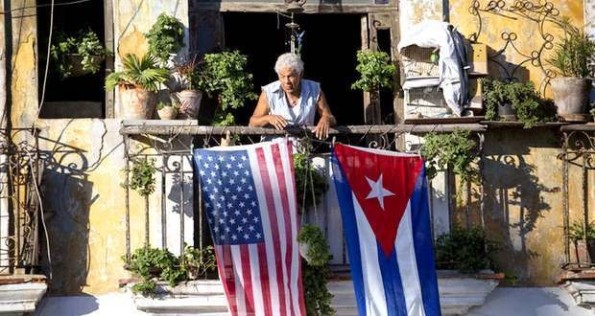Note: OLPL appears in this video speaking in English
Chiquita: A Brilliant Novel / Angel Santiesteban
The last time State Security allowed me to leave the country was in 2008, to a Book Fair in the Dominican Republic, which I attended as a judge for a literary prize; and from where I returned with my blog “The Children Nobody Wanted.”
But that’s not what I want to talk about in this post, but rather about a novel I discovered on that trip, the winner of the Alfaguara Prize, by Cuban author, Antonio Orlando Rodríguez: Little One (Chiquita); although the magnitude of the novel should indicate that it’s not (so little) since the author tells the story of the immense life of Espiridiona Cenda del Castillo, a Lilliputian who was born in the city of Matanzas one 14th of December, 1869. continue reading
This miniature-sized human being achieved fame once she decided to travel—with her brother and a pianist cousin—in order to triumph in the artistic world and capitalize on her voice lessons and 26-inch size.
Her ups and downs began after June 30, 1896, when she left Cuba for New York with a vaudeville show. In New York she performed on the best vaudeville stages and became one of the genre’s most successful artists. She traveled the world.
Oddly, she had a charisma that made people want to enlist her in the important causes of the time. The most righteous of these was the cause for Cuban independence, and she was visited by no less than a group of Cubans led by Tomás Estrada Palma, who had the dual charge of delegate of the Cuban Revolutionary Party and ambassador-at-large of the Republic of Cuba in Arms against the United States, and who would eventually become the first President of Cuba.
She was also welcomed by, among many other celebrities, millionaires and people of influence, U.S. President William McKinley, who was later assassinated while in office.
In a rewarding, literary subplot—from the moment she meets Alejo Romanov, third son of Alexander the Second of Russia, on his visit to the city of Matanzas, during which he gives her a gold chain with a tiny watch face as a good luck charm—an intriguing story begins in which the author himself acknowledges at the end of the novel he has “unscrupulously interwoven historical truth and fantasy,” license that adds intriguing turns of events and raises readers’ interest as well as the literary level of the author, who hails from Ciego de Ávila, Cuba.
The author’s humor and trickery, which interfere in the novel with mastery and achievement, provide a fresh, very Cuban flavor to the reader.
My first reading of this novel was ruined, as I told you in the beginning, at that Book Fair in the D.R., while reading in sessions at the same booth where it was for sale and, consequently, once I finished, I promised myself to come back to it and give it a more thorough and uninterrupted reading.
Thanks to life’s lovely coincidences, oppositional and independent journalist Lilianne Ruiz handed me a copy of the book, which life long journalist, Reinaldo Escobar, had sent her from his personal library and for which I will be forever grateful to them both; because I enjoyed this reading more than the first—so much so, that I re-read it in three days.
My pretense for sharing these brief comments is to invite Cubans who have not already done so to find this book and have the pleasure of reading it, enrich their personal library and, best of all, add culture and historical knowledge to their mental archives.
For my part—even though I’m a colleague of the author, who claims that being a writer is synonymous with being a “professional liar”—I only have tried to tell you the truth.
December, 2014. Jaimanitas Border Control Unit Prison, Havana.
Translated by: Kathy Fox
The situation of religious liberty in Cuba / Mario Lleonart
The delegation from Instituto Patmos, invited by United for Human Rights to the celebration of the 66th anniversary of the Universal Declaration of Human Rights.
During all of 2014 this blog, Cubano Confesante, I examined the best part of the thirty questions that doubt the supposed religious liberties in Cuba, which were launched in September of 2013 during the trip we took to Washington, invited by Christian Solidarity Worldwide (CSW).
These analyses were the object of discussion in forums and workshops convened by the Instituto Patmos in various sites in Cuba, and at times also some of those posts were the fruit of these. This contributed to sharing these contents in an island where access to internet is difficult. continue reading
Arriving precisely at the end of the year we arrived in the said review at the middle of those questions, the fifteenth, having realized that the majority of them, lamentably, far from being no longer applicable, had maintained or had increased. Only in the case of two can we breathe more easily:
Why the failure to account for the wave of repression that took place during the visit of Pope Benedict XVI during which hundreds of people were arbitrarily detained or threatened, and of whom still remain in prison and threatened with severe penalties Sonia Garro and her husband Ramón Alejandro Muñoz*?
It continues still without giving account about the repressive wave, not the regime in Cuba that triggered it, nor the Vatican that tolerated it, have given explanations in this regard. But at least Sonia Garro and Alejandro Ramón were let out of prison on December 9 to be prisoners in their own homes as a home detainment. We will continue arguing this question until there is accountability concerning the repression which attracted representatives of civil society in Cuba in the March 2012 visit of Benedicto XVI. And until Sonia and Ramon have the freedom they deserve.
Why not free the United States citizen Alan Gross, who was left a prisoner in Cuba for supporting with technology the Jewish Cuban community and who serves as a warning to anyone else who decides to be supportive with any other existing religious communities?
Fortunately since December 17, Alan Gross is free. It ended an outrage that lasted five years and which clearly was a kidnapping that the regime in Cuba used in order to pressure the Government of the United States to release their five spies discovered as part of the Red Avispa network, which was operating in its territory.
Throughout the year we were publishing, among others, a series of posts dedicated to reviewing the thirty questions whose validity is unfortunately preserved almost in its entirety. [Note to English readers: as not all these posts were translated the list is not reproduced here.]
*Translator’s note: Since this post was written they have been released.
Translated by: Hombre de Paz
28 December 2014
So we remember him? /14ymedio, Eliecer Avila
14ymedio, Eliecer Avila, Havana, 8 January 2015 — They say some animals possess the ability to perceive when natural phenomenon will occur. Man, however much he has evolved, is still an animal and retains some primitive characteristics. I don’t know if this sharp sense is present in our DNA. What I do know, is that we have a great ability to read between the lines of what happens around us and to draw logical conclusions and even to predict great events.
These days my neighbors and friends are behaving oddly. They speak softly, and in whispers share a kind of “sensitive information.” In general, they try to connect the dots…
There is a subtle but clear increase in surveillance in the streets, according to some. The press, radio and TV, with equal subtlety, increasingly broadcast more materials alluding to the former president Fidel Castro.
In fact, for days they’ve been airing a series called “Moments of the Revolution.” In this Thursday’s episode they showed a young and vigorous Fidel delivering a speech to the United Nations. The final sentence of the program perplexed me: “So we remember him…”
Nobody has missed Fidel’s silence on the historic events that marked the end of the year for Cuba and its politics. This has been, to my knowledge, the root of opinions and rumors gaining strength as the days go by. The more moderate of these suppositions refer to the historic leader’s delicate state of health. Others are less optimistic and theorize about the political interplay of dates and opportunities, which is typical of those systems that normally prefer mystery over timely and reasonable information.
For my part, I can only attest to an event unprecedented in recent years, at least where I have knowledge. It is, incredibly, nothing more and nothing less than the fact that Fish-for-Fish* has come to the bodega, instead of Chicken-for-Fish*. Yes, the kind that comes from the sea (imported mackerel).
In the face of this novelty that surprises us lately, I imagine that many don’t know whether to be happy or fearful. We’ll see.
*Translator’s note: Fish is supposedly part of the monthly food rations sold at reduced prices. However, as it is rarely, if ever, available, the ration stores routinely announce “chicken-for-fish,” substituting chicken for the fish ration. On the day that Obama and Raul Castro announced the new accords, fish was made available in the ration stores.
Learning to live without Fidel Castro / 14ymedio, Rosa Lopez
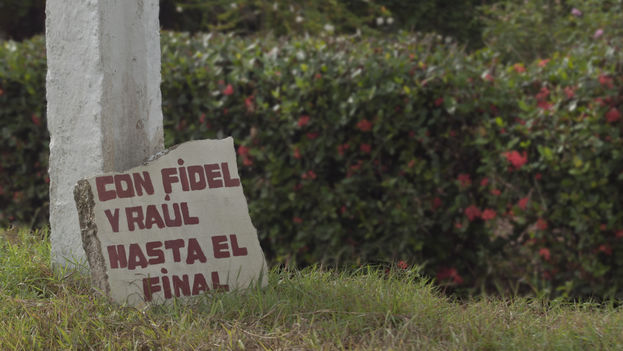
14ymedio, Rosa Lopez, Havana, 8 January 2015 — A poster with Fidel Castro’s face is pasted on the glass of the deteriorated locale. Years ago, some naughty boy painted the whites of his eyes dark and the effect is intimidating, but almost nobody sees it. The man who wanted to be indispensable and omnipresent for Cubans, has come to resemble the air, which few perceive although it is everywhere.
Learning to live without Fidel Castro has been an urgent subject for many Cubans during all these years of the convalescence of the Maximum Leader. Lately, however, the rumors of his death have reappeared and there are those who have dusted off the memories or rushed to close the national chapter where he had too much of a starring role.
Adele’s family was one of the first in the Vibora neighborhood to put the phrase “This is your house, Fidel,” on the door. From then until now, this woman has worshiped the man who, in the photo hanging on the wall of her modest house, wears a beard and a military uniform. “I’m a Fidelista to the death,” she says almost angrily in front of her grandchildren who don’t seem to have come out as fervent as their grandmother. “Here, everything bad that has happened, they’ve ignored it,” explains the lady. For her, the absence of recent months is because “surely, he’s writing some book, his memoirs, or something like that.” continue reading
In a little lost village in the hills of the Escambray, Juan Manuel doesn’t agree. “At best he died a long time ago,” says this 28-year-old peasant who lives in one of the concrete buildings in the area where “reliable people” were moved after the events of the Escambray in the seventies. Although he comes from a military family, the young man shows little interest in politics and speaks of Fidel Castro in the past tense. “I saw him once when he passed through here in a jeep, but then he was a man full of energy,” he says, making an effort to remember.
Others, more savvy, note how long it’s been since the Maximum Leader has appeared on national television. “For about a year they haven’t even shown a live and moving image of him. Lately, we haven’t seen anything but stills,” says Miguel, a member of the Communist Party who sells discs with music and movies on the streets of Cerro. “If Raul has been able to arrange things with the yumas [Americans] it’s because he must already be very sick,” he theorizes and when he mentions the personal pronoun he makes a slight gesture with his hand making a beard on his chin. Everyone listening knows who he’s talking about.
However, beyond the speculations, passions and indifference, there are realities that point to the fading of the figure of Fidel Castro and his role in national life. For more than a year, he’s not been among the characters of any of the jokes on the street, although the stories of Pepito with Fidel Castro have flooded Cuban imagery from decades. Nor have there been any new nicknames for this man who came to have a list of dozens of epithets, insults and nicknames. It’s also significant that they haven’t hung the nickname of the latest soap opera villain on him, although lately there are several of these soaps on the small screen. Fidel Castro is dead in the collective imagination.
Ana Maria was born with the new millennium and now she’s finishing high school. “Yes, in the textbooks there are a lot of phrases with him,” explains this teenager who belongs to a generation that only remembers a convalescent Fidel Castro. “My grandfather told me some things about how it was before, that he gave several hour long speeches,” she says as if she were speaking of something very remote. If you ask her about the long time since the one-time president has appeared in public, she just shrugs her shoulders as if she hadn’t thought about it.
A prophetic joke is coming to pass. It said that in the Cuban encyclopedias published in the year 3000, the entry for Fidel Castro would have a brief entry. “Politician of the era of the Van Van orchestra,” say those who jokingly repeat this gag. For those born in recent years, the Commander in Chief will be remembered as an old man who appeared sporadically in photos, wrote about moringa and dressed in a tracksuit.
“The truth is that ‘The Five” have been here a lot of days and he hasn’t come out to even give them a hug, it’s a clear signal,” says the physiotherapist who talks with the old people who come the central Havana polyclinic every morning. “People come here with all kinds of stories, that he’s had a stroke, that they’re going to disconnect the machines after January 8, that he’s frozen, but I will believe it when I see it.” To conclude, and while helping a lady up from a chair, she says, “I have lost count of how many times we’ve buried him.”
Outside the Hotel Inglaterra, a foreign journalist asks a young woman: “What will happen if Fidel Castro dies?” His poor Spanish has led to the frequent mistake of saying “if” instead of “when,” which would be correct in this case. One wrong word and the reporter has left open the possibility of immortality.
The legends of a vital return are also mixed with speculations in the last weeks. “This, this is hoping that we think that it’s cool to return,” explains the custodian of a warehouse near the Almendares River. His hypothesis is shared with an old ousted official. “No, until January 10 he’s not going to reappear because he’s resting,” he says, while saying his source is very close.
The last years of Fidel Castro are happening among rumors, speculation and forgetting. There are signs that the news about his end will not have the social or political repercussion that it would have caused decades ago.
The Way Things Go / Regina Coyula
One of the things that I am going to miss when Cuba is an ordinary country, will be these days when digital piracy is still patriotic and on any corner you can acquire the best of the Discovery Channel, the magnificent series of the History Channel, or the captivating serials of ABC or Fox. With regards to the series, I am greatly enjoying Mad Men, partially broadcast here in the early hours of morning as “The Men of Madison Street.” With these series and movies on demand, I only turn on Cuban TV for the news, a brief moment of Telesur to read the news crawl across the bottom of the image.
If I, who am a great joker and not interested in reality, nor MTV, nor soap operas and all I want is to stay far from national programming; what about my neighbors. The head of the family, my neighbor Tomás, whom I’ve already talked about here, has lost the fight. It seems that as a Party member, they’ve “targeted” him in the fight against the audiovisual packets, but his wife and even his daughter, also a party member and civilian employee of the Ministry of the Interior, adore The Voice, El Gorda y la Flaca, Dancing with the Stars, Belleza Latina, and especially Case Closed. Tomás’s wife made a strong statement of her intentions to Tomás, and given the volume at which she did it, to the rest of the neighborhood:
“So here people can hold their ‘worm’* meetings and nothing happens (that’s us); they can hold their religious meetings and nothing happens (my neighbor Tania, whom you also know), and I can’t watch “Case Closed”? Because to me %$#@!… I get the &$%#!… I watch it and you’re not going to stop me!”
*Translator’s note: Gusanos (worms) is a common insult used by the Castro regime against those who leave Cuba and/or who don’t support the regime.
7 January 2105
Twelve Dead in a Shooting at the Headquarters of the French Satirical Weekly ‘Charlie Hebdo’ / 14ymedio

14YMEDIO, Madrid, 7 January 2015 — The three presumed perpetrators of the attack against the satirical weekly Charlie Hebdo that claimed the lives of twelve people this Wednesday have already been identified, according to several French media outlets. The attack left at least 10 wounded and 12 dead, eight of whom were journalists. Among them are the editor of the publication, Stephane Charbonnier Charb, and another three long-time cartoonists, Cabu, Tignous and Wolinski, besides two police officers. The chief editor of the weekly, Gerard Biard, was in London, which saved him from the attack.
The daily Metronews website explains that the suspects are three men aged 34, 32 and 18 with histories of cooperating with jihadist networks. According to this outlet, they would be brothers Said K. and Cherif K. of French nationality, while the younger would answer to the name of Hamyd M., but his nationality is unknown. The latter was enrolled last year in secondary school in Reims (northern France), according to these reports, which have not been officially confirmed. continue reading
Cherif K. was tried in 2005 for being part of a cell sending jihadists to Iraq that would have recruited some dozen youths to go to combat in Iraq between 2003 and 2005. He was then sentenced to three years in prison, half of that suspended.
For its part, the weekly Le Point says that the three suspects were identified by an identity card found in the vehicle in which they fled the location of the events and in which they collided with another car in the northeast of Paris.
The French government has raised to maximum level the antiterrorist alert and has mobilized more than 3,000 members of the security forces in the operation to search for and capture the perpetrators of the attack.
Thousands of people have gathered in the emblematic Parisian Plaza of the Republic, in absolute silence, to protest against the terrorist massacre. The protestors have responded to spontaneous calls made through social networks, and many of them carried signs with the legend: “Je suis Charlie” (“I am Charlie”).
Several witnesses have told French television station iTele that three men dressed in black and wearing hoods entered the headquarters of the weekly armed with Kalashnikovs and shot at the people present in the editorial office. One of the Charlie Hebdo journalists has explained to the chain that many shots were heard inside the building.
French President Francois Hollande went quickly to the magazine’s headquarters, located in Paris’s District 11, where he has confirmed the number of victims and has announced that four of the wounded are in serious condition. “France is in shock,” said the president who has classified the attack as “extraordinary barbarity.” “We must demonstrate that we are a united country. I am going to act with firmness in the coming days and weeks,” said Hollande who has declared the highest antiterrorist alert level. Classes have been suspended.
British Prime Minister David Cameron has shown solidarity in statements from London. “We are with the French people in the fight against terror and in defense of freedom of expression,” he declared. His vice minister, Nick Clegg, also has condemned the attack and stressed that it is an act against press freedom.
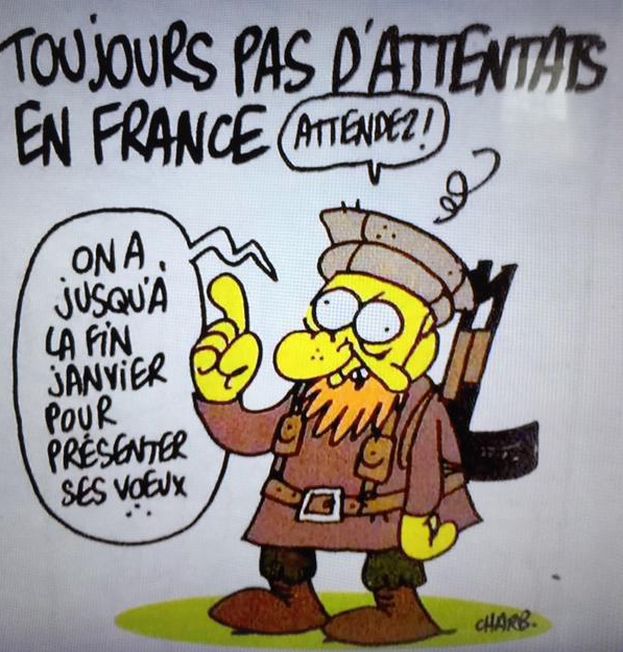
Solidarity with France has come from other points. Both the Russian President Vladimir Putin and the White House, as well as the German Chancellor Angela Merkel and the Spanish Prime Minister Mariano Rajoy, have expressed their condolences to Francois Hollande. “It is an intolerable act, a barbarity that concerns us all as human beings and as Europeans,” the European Commission has said through a statement by its president Jean-Claude Juncker. US President Barack Obama has offered assistance to France to bring the guilty “terrorists” to justice.
Charlie Hebdo has received threats for having published caricatures of Mohammed. The journalist Vincent Justin, who worked in an office next to the weekly’s headquarter, has assured the EFE agency that the parties responsible for the shooting justified the action with the sentence: “We are going to avenge the prophet.”
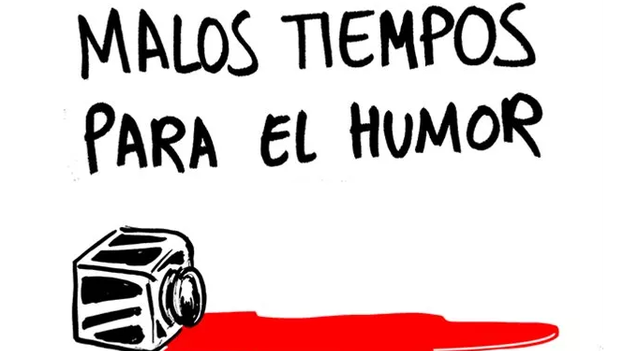
French Muslim leaders already have demonstrated their rejection of the attack. The rector of the Paris mosque, Dalil Boubakeur, has classified the attack as a “declaration of war” and has bluntly condemned the shooting. The imam of Paris said that “the cartoons have to be responded to as cartoons,” while the imam of Drancy (in Seine-Saint-Denis, on the outskirts of Paris) has characterized the Charlie Hebdo journalists as “martyrs of liberty:” “Their prophet is not Mohammed, it is Satan,” he added.
In 2011 the headquarters of the magazine suffered an attack with a Molotov cocktail that caused a fire and widespread damage. That attack was carried out a day after the publication of an edition entitled Sharia Hebdo, dedicated to the Islamist advance in Tunisia and Libya, which portrayed Mohammed as the chief editor of the caricature edition.
Translated by MLK
Appeal against the arrest of graffiti artist El Sexto rejected; prisoner transferred to Valle Grande / Diario de Cuba
 Diario de Cuba, Havana, 7 January 2015 — The graffiti artist Danilo Maldonado, known as El Sexto, remains imprisoned in Valle Grande prison after authorities rejected the habeas corpus appeal presented by the Cubalex organization, led by independent counsel Laritza Diversent.
Diario de Cuba, Havana, 7 January 2015 — The graffiti artist Danilo Maldonado, known as El Sexto, remains imprisoned in Valle Grande prison after authorities rejected the habeas corpus appeal presented by the Cubalex organization, led by independent counsel Laritza Diversent.
The appeal denounced the “arbitrary detention” of El Sexto which took place when he led two pigs, named Fidel and Raul, to stage a performance in Havana’s Central Park on 26 December. The graffiti artist is accused of “insult.”
Diversent explained to Diario de Cuba this Wednesday that the authorities rejected the appeal “with very subtle arguments” and hid behind an assertion that there was “no legal basis” to consider the arrest as “illegal.”
The independent counsel recalled that her appeal did not cite the detention as illegal but “arbitrary.” Likewise, in her demand she specified that the names of pigs, Fidel and Raul, were “common” and that authorities had to “accept criticism.”
For now, according to independent counsel, there is still no trial date and she hopes that there will be a change of custody, because the events in which El Sexto is involved are a “misdemeanor.”
Also, Diversent said that she had sent information to international bodies so that they will speak out on the situation of graffiti artist.
“We have a great vocation to commit the same mistakes” / 14ymedio, Reinaldo Escobar

14ymedio, Reinaldo Escobar, 6 January 2015 – Longing and love for Cuba have been a constant in her life. Sociology professor, scholar of Cuban history, and promoter of initiatives to bring “the two shores” closer, Marifeli Perez-Stable is a woman who raises passions and whose prose has the ability to make us reflect. Decades ago she embraced the idea of the Cuban Revolution, but she also knew its failure, and the disillusionment it caused so many. Today, she is a person of two cultures and two countries.
The first part of this conversation, that we present to the readers of 14ymedio, took place in Mexico City with coffees in front of us, and the second was via email after the announcement of the reestablishment of relations between the United States and Cuba, on 17 December.
Question: You have defined your generation as the one that buried its grandparents and parents outside the island. And the most recent exile, how do you see them?
Answer: I’m more familiar with those who are relatively young. They are lucky that they didn’t make the break that we were forced to. They can go back and see their families, they send money to help them, they have their own identity. I’m delighted to have them in the classroom when I’m teaching. Many have at least one of their parents in Cuba. Now, amid the abnormality, there is a normality that we did not have. So I’m going to die with a certain internal emptiness that I can no longer fill, no matter what, because I could not develop as a person nor as a professional in Cuba. continue reading
Q: How did you arrive in an unknown country and start from nothing?
A: When we left the island my mother suffered a severe dislocation and great depression. It wasn’t just for the loss of Cuba, but also for the loss of her social status. Her despondency was contagious and I was 11, so I was a girl who only knew how to play and study. When I started at the university I barely knew what I wanted to be. Then I did a Master’s in Political Science, and although I knew I would be studying themes related to Cuba, the fact is that I didn’t know much about my own country.
Q: You have gone through the experience of facing accusations from both extremes of the range of political positions. How do you handle these attacks?
A: The main evolution is that I no longer care about these attacks, whether from one side or the other. I am not anyone’s agent, neither the CIA’s nor the FBI’s nor Cuban State Security’s. For a little less than twenty years I sympathized with a process known as the “Cuban Revolution,” but I’ve spent many more years opposing this phenomenon. When a 2008 Miami television program invited a former US army colonel who made serious accusations against me and against other people, as if we were Cuban spies, yes, I was shaken up. I responded with a column saying that espionage was the antithesis of who I was. But now I don’t react to these attacks.
Q: You’ve published several books, among them “The Cuban Revolution: Origins, Development and Legacy” and “The United States and Cuba: Intimate Enemies,” What other national studies themes have you addressed in your studies?
A: I reconsidered, with special attention, two aspects of our past. One of them concerns the “reconcentrados*” during the War of 1895 in the era of General Valeriano Weyler; the other is the autonomists [the Home Rule Party]. In relation to the war it should be noted that Cuba then had 1.5 million inhabitants, but there were 178,000 deaths, basically among the farmers and civilians who roamed the cities without any chance of finding food.
I don’t like this type of comparison, but in the Civil War in the United States, around 625,000 soldiers and 50,000 civilians died, especially in the South. In that country at that time this meant some 2.5% of the population. In our war the figure was 10%, of whom the immense majority were civilians. If we compare the impact that the War of Succession still has on the United States, with that of the War of Independence in Cuba, we have to conclude that we have an enormous vocation for committing the same mistakes.
Q: And the autonomists?
A: José Martí said that they were the party of the permanent mistake, but you can see clearly that they weren’t rejected in the Republic. They conceived a democratic Cuba and, given the current disaster, you can’t say they were more disastrous.
Q: The term “dialoguero” [“dialogue-er”] is used against those who say they can talk with the Cuban authorities. Do you think that dialogue could still happen between the opposition and the government?
A: This has to define Cubans who live on the island. As things are today in Cuba, the conditions aren’t there, because the government refuses to talk. I think a lot about the transitions in Eastern Europe and in Latin American, but it remains to be seen if Raul Castro will leave power in 2018 as he has promised. We also have to take into account that anger of so many people within Cuba. This can trigger very disagreeable situations and, like many others, I don’t want this to happen.
Q: With regards to the normalization of relations between the United States and Cuba, do you think one stage is ending and another beginning?
A: The announcement of 17 December adds a new dimension to the relations between Washington and Havana. There’s no conclusion to the old, nor the beginning of something new, if by that we mean a rupture. Although Obama was extraordinary, we can’t forget that in the ‘70s Ford and Carter headed in the same direction. In the ‘90s, Clinton also tried to improve relations but his effort didn’t come to fruition either. Obama was wise to make the announcement of normalization of relations out of the blue. He talked about a trip to Cuba by John Kerry before the Panama Summit. At the Summit, Latin American and Caribbean leaders will applaud Obama and Raul Castro. Finally the United States turned aside from the rocky road of old policies, for its relations with Latin American countries!
While Raul Castro affirmed before the National Assembly that Cuba had won the war, we would have to question the conditions of this triumph. The economy hasn’t taken off despite reforms and daily life for ordinary Cubans continues to be an ordeal. Two weeks after the change, Havana blocked the performance arranged by Tania Bruguera in support of freedom of expression. Some 70 opponents were arrested. The opposition isn’t going to sit by with its arms crossed. Will the government have the ability to recharge its batteries and develop other methods for dealing with the opposition? Above all, our people on the island are exhausted by the despair and the distrust. We will see if those at the top remain mired in the same things, or dare to seek out new directions.
*Translator’s note: “Reconcentrados,” (reconcentrated) in the War of 1895, refers to rural residents relocated to towns, combined with the destruction of the land from which the rebels supported themselves. See here for more.
Obama’s new policy toward Cuba could mark the end of the olive-green autocracy / Ivan Garcia
I understand the discontent of an important sector of Cubans in exile and within the internal dissidence.
On 17 November, just one month before the momentous diplomatic turn of events between Cuba and the United States, I was charring in Brickell, Miami, with a gentleman who explained to me his reasons for hating the Castro brothers. That day, a fine rain fell over Miami. The bitter cold wasn’t the welcome one expects to receive in that thriving city of the sun.
The man had lost a lot. In 1959, his father was shot after a summary trial in the La Cabaña Fortress by order of Ernesto Che Guevara. His “crime,” had been being a police officer under Batista.
“He hadn’t committed any crime. He did not torture any member of the 26th of July Movement. He was shot only for political revenge and the hatred of Fidel Castro’s revolutionary government. Later they shot my uncle who was raised in the Escambray. And many friends and relatives were imprisoned, in subhuman conditions, just for thinking differently,” he recalled with tears in his eyes. continue reading
In one of the pavilions at Miami’s International Book Fair, Hector Carrillo, Radio Marti producer, told me about his father, a notable architect, who lost all his properties and one autumn night died far from the country that saw his birth.
His “sin” had been to create riches and design architectural spaces that once made Havana a cosmopolitan city. Carrillo was born in the United States, but he felt Cuban. He eats black beans and drinks Cuban-style coffee.
The film critic Alejandro Rios, a more recent immigrant, who probably didn’t lose any family member at the execution wall or in a Castro-regime dungeon, also has his demons in tow. He grew up and became a man in a Havana neighborhood, breakfasting on coffee without milk and with a mother who darned his father’s old socks so his brothers could go to school.
Unlike the previous compatriots, Juan Juan Almeida grew up as an olive-green bob vivant. Shops and entertainment at his fingertips. When, in the ’90s, people were suffering malnutrition and daily 12-hour black outs, the families of the nomenklatura, among whom was Almeida’s father, continued drinking Scotch, sleeping with high-class prostitutes, and fishing from yachts. That did not prevent Juan Juan from suffering the despotism of Raul Castro.
Four generations that have come to dissent against the Castro’s by different paths. And with different narratives, bet on a democratic future for Cuba.
The most important thing is not what viewpoint should prevail. In these 56 years, in one way or another, we have lost something. From our condition as free men to irrelevant citizens.
The government never asked us permission when the time came to trace their grotesques policies. We always should accept, without question, their strategies. Boarding schools in the countryside. African wars, verbal lynchings towards people who left Cuba, and systematic campaigns against the “enemies of the people”: nothing more and nothing less than ten White House administrations.
Ask any Cuban if they didn’t applaud the promises and illusions of a deceit.
President Obama’s new policies will not change the rabidly totalitarian mentality of a litter of old men who rule our destinies. But there are several Trojan Horses.
The United States needed to throw overboard that weighty and counterproductive foreign policy ballast. In the world, they ask others to support their crusade for democracy.
The United States has been, and is, a paradigm of freedoms. The mambises generals of the War of Independence asked the United States for help to free themselves from Spanish colonialism.
The United States thinks and acts according to its geopolitical interests. I will continue to bet on democracy and human rights on the planet, but behind it is the stage of the gunboats or installing satraps at the convenience of Washington.
The new rules of the game open up a formidable framework of options for the Island’s dissidence. That can take advantage. Now the regime has no pretext as a country under siege.
The time for the Cuban opposition to pass on the offensive is past. And trace a coherent political strategy which it can shout out to a wide segment of the population.
It’s time to demand a place in the political establishment. It has every right in the world to govern. Especially when 56 years of Castro regime socialism has been a disaster.
There are many issues that affect the citizenry, the dissidence could wave them as a political flag. How can the government now justify excessive taxation on private work. Or the prohibitions on 3D cinemas and private stores.
There is almost unanimous agreement among Cubans, that the prices in the convertible peso stores are absurd and exaggerated for a working population that, on average, collects a monthly salary of $20.
Yes, there is a United States embargo. But why not debate the internal blockade against creativity, freedom of expression, politics and economy in our society.
Will they lower the science-fiction level prices of cars for sale? Will the lower the five-dollar-an-hour cost of navigating the internet? Will they eliminate the irrational customs taxes and fees.
Will the repeal the dark gag law, that calls for 30 years in prison for dissidents and free journalists?
Now the dissidence can, joining the clamor of the majority, be a sounding board and force the State to raise the miserable wages, authorize independent unions, the right to strike, and allow free contracting for labor and direct payment of wages by foreign businesses.*
If they are in tune with the feelings of ordinary Cubans, the dissidents will add followers and gain spaces. It’s quite probably that the government, still intoxicated by their diplomatic triumph, will not cede. And it will maintain control of the media and harass the opposition.
According to Raul Castro’s latest discourse at the closing of the monotone national parliament, nothing will change.
The regime is not going to give anything. It never did. Certain rights will have to be grabbed.
*Translator’s note: Under current law, foreign-owned businesses must contract with the government for labor and workers are paid only a small portion of what the businesses pay the government.
4 January 2015
One Day for Cuba / 14ymedio
[Note: One of more of the videos have English subtitles, but most are in Spanish]
14ymedio, 6 January 2015 – One Day For Cuba is the name of a new independent action from #YoExijo that takes the spirit of Tania Bruguera’s performance to appeal to the Cuban Government, and to a lesser extent to the US government, to listen to the demands of the Cuban people. Citizens can send and upload to the platform a one-minute long video formulating their requests. Some well-known artists, such as the actor Roberto San Martin, the rapper Don Eldon or the musician and writer Frank Sorie, have already sent their videos.
The action has been presented on the Youtube platform with this manifesto: “A day has 24 hours, every hour has 60 minutes; so a full day consists of 1440 minutes. Taking off from recent events, and inspired by the platform #YoTambienExijo [I Also Demand], following the proposal of multiple participants from civil society, we want to create an on-line platform where everyone can record a one-minute video and compile them in a single site. Out objective will be to bring 1440 one-minute videos, forming A Day For Cuba.”
The artist Ana Olema is one of the driving forces of the action, according to Diario de Cuba, which explained that the project aims to shed light on the real demands and concerns of civil society.
I also demand / Jeovany Jimenez Vega
By Jeovany Jimenez Vega
For the mere act of having been born a man, to be thinking, already implies in inalienable right to express myself freely without waiting for the permission of another man.
Because my right of freedom of assembly and association are provided for by international agreements recognized by the civilized world, and these agreements are found to be above the decision of the dictators that try to continue enslaving the mind of my people with its out of date demagoguery.
Because the universal right of peaceful protest implies that the streets and plazas that belong to all Cubans and not to that group that tries to set themselves up as the only owner, that group that tries to monopolize the street only for the “revolutionaries.” continue reading
Because if a real revolution is progression, dialectical forward, 180-degree turn forward, then the retrograde breed that from the power hinders the progress of my people today doesn’t deserve anything but to call themselves counterrevolutionaries.
Because more than 50 years of monologue from an undeserved altar already was too much and today it is its turn before the jury of the people of Cuba, to the betrayed, today has arrived, finally, the offended’s turn.
For all this, I also demand:
That the Cuban government ratify and immediately and unconditionally implement the International Covenants on Civil and Political Human Rights and Economic, Social, and Cultural Rights that it left pending as of February 2008.
That the Cuban authorities officially recognize the existence and legitimacy of the Cuban opposition, and consequently call democratic elections where the entire spectrum of the plurality of thought of Cuban society is represented.
That an effective separation of powers be established. In this sense, it would be essential that the People’s Supreme court, highest authority of judicial power, stop being under the Council of State, highest authority of executive power, so that the judges of the People’s courts being affiliated with the Communist Party of Cuba would be prohibited, something that would favor their credibility in the impartial exercise of justice.
Let it consequently stop the harassment, persecution or any type of repression of any individual group that tries to express its political position publicly and peacefully, as well as stopping the arbitrary detentions of civic activists that represent a dissident proposal.
That the Communist Party of Cuba and Cuban State Security stop organizing the sad infamous acts of repudiation, which are profoundly damaging to the dignity of those that they perpetrate, as well as unequivocally noxious to the public morality; consequently those acts become considered as a body of crime by the existing Penal Code, at which moment will be sanctioned under the law as they have always been: authentic acts of vandalism, that include invasion of the home and/or aggression and danger to persons.
That it establish an appropriate legal framework that guarantees a full freedom of the press and total access and without censorship to the Internet as means for the exercise of our freedom of expression, from which all can, without fear of being punished for it, to propose a better way of changing these ruins that we inherit in that nation that we have, as the first law of the republic, the cuban worship of the full dignity of man.
For all these reasons: #YoTambiénExijo
Translated by: BW
Here Comes the Packet, Knock, Knock / 14ymedio, Orlando Palma
 Research shows that among the main forms of cultural consumption in Cuba are television, visiting with friends and listening to music
Research shows that among the main forms of cultural consumption in Cuba are television, visiting with friends and listening to music
14ymedio, ORLANDO PALMA, Havana, 5 January 2015 — A Cuban television special this Sunday entitled “They Call Me Cuba” addressed issues of “cultural consumption in the 21st century,” with special emphasis on the well-known weekly packet of audio-visual material that is distributed illegally throughout the country. Some specialists answered questions ranging from musical tastes to the need to impose cultural policy on the private and tourist sectors.
The results of an investigation carried out by the Juan Marinello Center have revealed that among the main forms of cultural consumption in Cuba are “television, spending time with friends and listening to music.” Pedro Emilio Moras, a researcher for that entity, said that, “The main way for the Cuban population to participate in culture is as the public, as the beneficiary of offerings, actions organized by cultural institutions.” Although he also asserted that, “We recognize that the houses where we live (…) are ideal scenarios for the cultural development of people, even our reality is the space par excellence.” continue reading
Just inside the homes, out of the control of the cultural supervisors and far from the censorship scissors, the packet has life. The numbers of audience members lost by official television is never made public, but, in view of the worry that its officials demonstrate, the phenomenon of the packet-ization of Cuban society must be reaching significant levels.
They Call Me Cuba emphasized that the country “is enjoying a moment of transformation not only economically but also socially. The establishments that belong to the non-state sector have taken their own initiative when it comes to animating their environment.” According to the report, there then arises “the question of how these entities are welcomed or not into the country’s cultural policy.”
It has not only to do with the time – ever greater – that people invest in consuming material of their choosing to the detriment of what’s shown on state television, but the social impact that the private spaces have on the formation of taste and musical and audio-visual distribution. In order to decrease that influence theater critic and researcher Jaime Gomez Triana urged that “the Government’s cultural policy be not only a policy for the Ministry of Culture’s institutions but that it be a cultural policy that regulates the way in which these offering are produced in other spaces.”
In interviews conducted on the street, several people referred to their experiences as consumers of the packet. The favorable opinions mentioned that an advantage of this kind of cultural consumption is that it gives better information about what is happening “in the international arena.” Reported among the factors leading to the increased alternative distribution of audio-visual content was the deterioration of the movie houses that domestically offer a poor substitute for public spaces.
The view that this compendium of audio-visual content is only “soap operas and reality shows” was challenged by several survey respondents who mentioned the didactic and instructive character of some materials like documentaries made by The Discovery Channel, as well as courses in make-up, gastronomy and handicrafts that are also included in the so-called combo.
Fernando Rojas, Vice Minister of Culture, in an interview, criticized those who concoct and distribute the packet as being “people who act strictly on their own and have a network that distributes that material that is updated periodically and that is made at the margins of the institutions and regulations for self-employed work.” In the judgment of Rojas, “the packet is made to feed the illusion that people are choosing (…) in reality, in a certain sense, and I stress in a certain sense, that idea about choosing is an illusion.”
In spite of the dread that the cultural institutions demonstrate before the advance of these forms of self-directed consumption, Rojas thinks that “people who talk so much about the topic of the packet, the famous packet, the aforementioned packet, give it greater importance than I believe it really has.” For the Vice Minister, “to the extent to which we move forward to a greater penetration of the Internet, and we are going to move forward, we are certainly going to move forward ever more, people are going to choose directly on the web and not have to depend on an intermediary. The packet is going to have a limited life in my judgment.”
Fabio Fernandez, content and programming director for the Cuban Institute of Radio and Television (ICRT), explained that among the great attractions of the packet is that “people can watch and listen to what they deem appropriate at the moment when they deem it appropriate.” The fact that “there is no direct relationship between the broadcast schedule times and the time a person decides to watch something” makes many choose this option that does not tie them to the screen on a determined broadcast schedule. To recover the viewers that national television has lost, the official bets on “offering ever more high quality products.”
Nevertheless, the formula for improving the official programming bill faces the difficulty of few resources for legally acquiring foreign content or advancing national production. Cuban television has underperformed in terms of quality, dynamism and thematic updates. An industry that was a pioneer in Latin America and the world has been suffering the fact that series and soap operas produced in Mexico, Colombia and Brazil captivate the public. The problem is rooted in issues that range from undercutting wages of actors and technical personnel to censorship that for decades caused bland, complacent scripts closer to sketches for a school morning assembly than to material to captivate and entertain.
Roberto Smith, president of the Cuban Institute of Cinematographic Art and Industry (ICAIC) said that it should be “based on the legitimacy of personal taste (…) some like one thing and others like another and that is their personal right, to prefer something and reject the other.” But later he remarked “that taste is educated, and that education is a process that must begin from earliest infancy. Right now we are developing (…) the possibility of offering different alternatives of audio-visual education from infancy for youth and for adults.”
Faced with the evidence that the demonization of the packet has only increased its attraction, Rojas confessed that “the path before any phenomenon (…) that is not desirable, in the sense that it is not a carrier of solid human values, of convictions and humanist, supportive, socialist feelings; the reaction before something that does not seem to us to fit in that formative educational effort, the reaction cannot be to prohibit it. The reaction has to be to compete.”
But the packet has come first to that competition with the advantage of being customizable, free from censorship, adjustable to all tastes and considered by the majority of Cubans as something outside of state control.
Translated by MLK
Armandito’s wheels / 14ymedio, Reinaldo Escobar
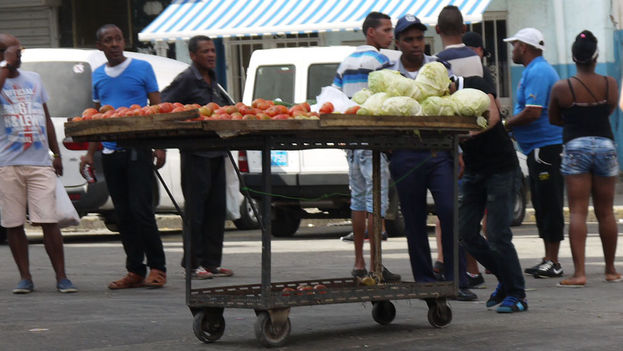
14ymedio, Reinaldo Escobar, Havana, 5 January 2014 – With the authorization of mobile vendors, among the new forms of self-employment, an unexpected problem has arisen: the wheels. I’m not going to wear myself out here talking about the intimate relationship that exists between translational movement and this circular mechanical piece that rotates around an axis. The lack of foresight is as obvious as it is surprising, on the part of the bureaucrats who did not take into account something so elemental. If there isn’t a good supply of wheels suitable to move certain volumes of merchandise, those who use a cart, a scooter, or a wheelbarrow will take them where they find them. continue reading
Dumpsters are the most frequent victims of this depredation. The extraction is not always done in a friendly way, that is undoing the screws that connect the rolling mechanism to the base of the trash container, because on many occasions it is more practical to rip them out by force or to take the whole container and sell the rest of the structure as raw material for the manufacture of clothespins.

A few yards from Prado and Neptuno, the mythical corner of the song, “La Engañadora,” [The Deceiver] the police have detained Armandito, a vegetable seller. Pushing his cabbages, tomatoes and onions, piled on a metallic structure that surely also qualifies as of doubtful origin. The law enforcement agents have examined the wheels and have determined they are illegal. Around the scene several bystanders intercede, asking for clemency. “This boy is working… Why can’t you leave him in peace,” a gray-haired man tells the officer.
“They’re ruining the dumpsters,” the cop replies, and the mobile vendor has no option but to let himself be taken to some police station to make a statement, where he might end up in a cell for hours or days. In the interrogation they will want to know how he acquired the wheels for his transport, who supplied them to him and at what price. A fine, a forfeiture, and if he’s a repeat offender it won’t end there.
Not far from where they caught the vendor, someone has installed the mutilated corner of a garbage container over a doorjamb. Still, full of holes and broken it will continue providing service to unsuspected limits and could be a victim of other thieves, who might rip off the remaining wheels. Will Armandito confess where he got his?
Political repression increases in Cuba during the month of December, according to CCHRNC / 14ymedio
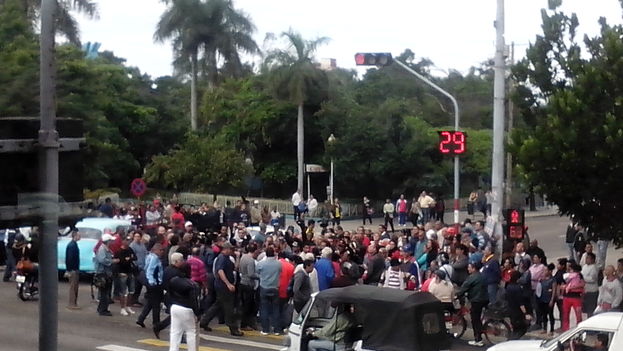
14ymedio, Havana, 5 January 2015 — According to its monthly report, during the month of December the Cuban Commission for Human Rights and reconciliation (CCDHRN) registered at least 489 arbitrary arrests for political reasons, closing out 2014 with at least 8,899 arrests for the year. continue reading
The commission, based in Havana, said that despite the reestablishment of relations between Cuba and the US, “The situation of civil and political rights and other fundamental rights in Cuba continues to be the worst in the entire Western Hemisphere.”
The month of December was marked by two events that produced a large number of arrests. The first occurred on December 10, World Human Rights Day. That date was marked by a wave of, “At least 234 arrests at the hands of the Cuban government, often with violence, of peaceful dissidents,” according to the CCDHRN report.
The second wave of arrests occurred on 30 December, the date of the ‘performance’ scheduled by Tania Bruguera for the Plaza of the Revolution. At least 70 people, including several reporters from this digital newspaper, were arrested by the political police for attending or trying to attend the Tatlin’s Whisper performance, which was intended to exercise the right of free expression. These detentions lasted, in some cases, up to 72 hours.
The CCDHRN also warned that, compared with November, in December there was an increase in, “The victims of physical aggression, acts of vandalism and harassment, and acts of repudiation.” Furthermore, three new political prisoners were jailed in December: Danilo Maldonado, Sonia González and Marcelino Abreu.



